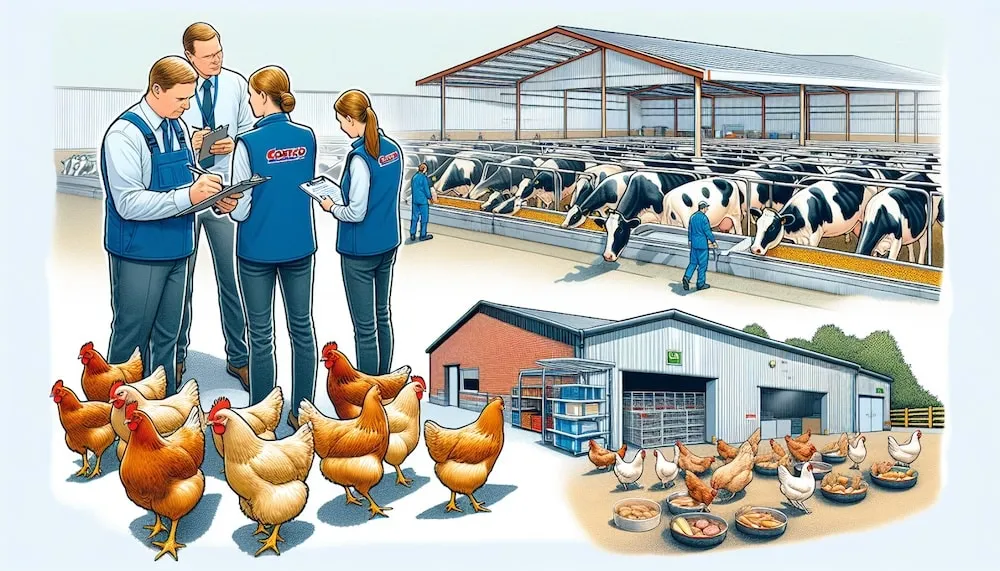Suppliers aiming to meet food traceability requirements for major retailers must ensure a transparent supply chain to guarantee consumer safety. This article outlines the compliance protocols, highlights the importance of traceability, and provides insights into meeting stringent safety measures demanded by leading grocery stores.
Key Takeaways
- Major retailers require suppliers to maintain strict traceability systems to track products from origin to store shelves, emphasizing transparency, swift crisis response, and food safety regulation compliance.
- Suppliers must meet rigorous documentation standards, engage in practices like the Produce Traceability Initiative, and be prepared for unannounced food safety audits and third-party certifications.
- The Foreign Supplier Verification Program (FSVP) imposes stringent food safety standards for imports, and suppliers must present documentation such as FSVP letters to meet U.S. requirements and maintain expected standards.
Food Safety and Traceability, Simplified
Meet FSMA 204 requirements with end-to-end traceability, cold chain monitoring, and recall-ready documentation.
Request a Demo
Retailer’s Food Traceability Expectations
When it comes to the food we eat, knowing its story is no longer a luxury but a necessity. At the heart of this narrative lies a commitment to traceability—a commitment that stretches from the soil to the store shelf. As a vital link in this chain, suppliers are held to stringent traceability protocols mandated by major retailers, aiming to ensure that every product can be tracked back through each stage of its journey.
The expectation is clear: suppliers must have a traceability system that provides transparency and reassurance to both the consumers and the corporation. It’s a system designed not only to enhance food safety but also to streamline product recalls and maintain consumer trust. For food manufacturers supplying major retailers, the bar is set high, and the importance of meeting it cannot be overstated.
Importance of Traceability
Traceability is the compass that steers the food industry through the murky waters of potential crises. When contamination arises, a well-implemented traceability system ensures a swift response, minimizing the impact on public health and the corporation’s reputation. Beyond the immediate benefits of crisis management, traceability also protects against the financial and legal repercussions of food safety incidents.
Moreover, with regulations growing increasingly stringent, traceability is no longer an option—it’s a requirement. It instills confidence not only in the end consumer but also within the business itself, knowing that every precaution has been taken to ensure food safety and regulatory compliance. It’s about building a legacy of quality that withstands the test of time and scrutiny.
Retailer’s Expectations
To live up to food safety expectations, suppliers must demonstrate meticulous documentation and data management across their supply chains. Every link, from the smallest producer to the largest distributor, is expected to contribute to a collective effort that guarantees the integrity of retailer products. Food safety audits are not just a procedure; they are a testament to a supplier’s commitment to excellence.
By engaging with initiatives like the Produce Traceability Initiative, suppliers can align their practices with the expectations set forth by major retailers. It’s about going beyond the baseline and embracing a culture of safety and quality that permeates every aspect of production and distribution. After all, being a supplier to a major retailer is about being part of a team that values the well-being of its customers above all else.

Meeting Retail and Grocery Traceability Requirements
As a supplier, stepping up to meet retail and grocery traceability requirements means:
- Establishing robust food safety policies.
- Adopting industry best practices.
- Being vigilant in areas such as HACCP planning, allergen control, and product traceability.
These are not merely guidelines; they are the foundations upon which major retailers have built their reputation for quality. Let’s look at some other factors that go into meeting these guidelines.
Implementing a Robust Traceability System
Crafting a robust traceability system is akin to building a bridge between your product and the consumer’s trust. To meet food safety expectations, suppliers must have an infallible policy in place, one that can withstand the scrutiny of a Good Manufacturing Practices, or GMP audit. It’s about creating a transparent pathway for products that ensures their integrity from start to finish.
The adoption of best practices from the Produce Traceability Initiative, coupled with the implementation of GS1 standards for labeling, fortifies this bridge. Cross-docking operations, too, play a pivotal role in maintaining a lean inventory, while a solid record-keeping system is a cornerstone of traceability for suppliers. It’s a multifaceted approach that requires precision, foresight, and a commitment to ongoing improvement.
Preparing for Audits
Facing a food safety audit is a significant moment for any supplier; it’s a test of their adherence to audit requirements and their readiness for any possibility. Annual GFSI certification audits are part of this rigorous routine, with the added layer of retailer-specific addendums. And with the introduction of unannounced GFSI audits, suppliers must always be prepared to demonstrate their compliance on the spot.
During these audits, suppliers must showcase their traceability exercise competency, with critical records ready for review within a tight two-hour window. Any trigger, such as a product recall or a serious incident, could prompt an immediate audit, making it imperative for suppliers to have rapid response strategies in place. Mock audits and engagement with GFSI consultants are prudent steps in preparing for these critical evaluations, ensuring systems are audit-ready at all times.
Integrating EDI to Enhance Traceability and Efficiency
To meet and exceed rigorous traceability requirements, leveraging Electronic Data Interchange (EDI) can be instrumental. EDI facilitates the automated exchange of critical data across the supply chain, enhancing the accuracy and speed of information flow, which is vital for effective traceability.
For instance, EDI transaction sets such as the X12 856 (Ship Notice/Manifest) can provide detailed information about shipped goods, including batch numbers, shipping details, and expected delivery timelines—all crucial for traceability. This not only streamlines the process of tracking products but also supports suppliers in meeting the demand for meticulous documentation and data management.
By integrating EDI, suppliers can ensure that all relevant traceability data is accurately captured and readily available for audits and inspections. This reduces manual errors, speeds up response times during crises such as recalls, and supports compliance with safety audits and third-party certifications. Moreover, EDI’s role in automating data exchange simplifies the adherence to initiatives like the Produce Traceability Initiative and FSVP, making it easier for suppliers to maintain transparent and efficient supply chains.

Foreign Supplier Verification Program (FSVP)
For those who bring flavors from afar to the shelves of major retailers, the Foreign Supplier Verification Program (FSVP) is a requirement. This program ensures that imported foods meet the same stringent safety standards as those produced within U.S. borders. A necessary partner to the domestic food safety framework, the FSVP is a standard that international suppliers cannot afford to overlook.
Retailers’ commitment to FSVP is an extension of their dedication to food safety. For imports to grace the aisles of these stores, they must be accompanied by an FSVP letter. Despite the challenges that arose during the pandemic, with temporary adjustments like remote inspections, the essence of the FSVP remains unchanged.
FSVP Requirements
Navigating the FSVP landscape requires foreign suppliers to be meticulous in their documentation. A documented FSVP letter is not just a formality; it’s a critical piece that can determine whether their products make it past U.S. Customs and Border Protection. This documentation is a reflection of a supplier’s commitment to upholding the food safety standards that retailers and their customers expect.
The stakes are high, as FDA inspections have revealed issues ranging from the absence of FSVPs to non-adherence to existing ones. The goal is clear: importers must ensure their foreign suppliers’ practices align with the preventive controls and produce safety standards of the U.S., ensuring the imported food is neither adulterated nor mislabeled. In certain cases, third-party certification may be required to solidify the trust in these safety measures.
Compliance Strategies
Staying ahead of the curve in FSVP compliance is a strategic move for foreign suppliers. Achieving food safety certification through an accredited third-party certification program is one such tactic that aligns with FSVP regulations. Certification can assist with the Voluntary Qualified Importer Program (VQIP), which facilitates a smoother entry into the U.S. market—an advantage that can translate into reduced import delays and associated costs.
Proactive participation in voluntary programs and maintaining rapid compliance with food safety standards not only aid in navigating the FSVP but also fortify the supplier’s relationship with major retailers.
Retailer’s Animal Welfare Audit

Leading retailers’ stewardship extends to the welfare of animals, a commitment encapsulated in their animal welfare audits. These audits are part of a mission to gather current and accurate information on the treatment of animals across the supply chain. It’s a reflection of the ethical stance, ensuring that animals involved in the production of food products are treated with respect and care.
The process is discreet yet thorough, with findings shared confidentially within the retailer’s Food Safety & Technology Group and Buying Staff. The auditors, equipped with PAACO certification and representing QIMA/WQS, are tasked with the significant responsibility of ensuring suppliers uphold high standards of animal welfare.
On-Farm Audits
When it comes to on-farm audits, the scope is comprehensive, embracing all creatures large and small. From the dairy cows grazing in the fields to the poultry that roam—or should roam—freely, these audits scrutinize the living conditions and treatment of these animals. It’s a critical assessment that ensures that the animal welfare standards upheld are mirrored in the practices of their suppliers.
These standards are not arbitrary; they are tailored to each animal category, recognizing the unique needs and welfare considerations of laying hens, veal calves, and meat poultry, among others.
Slaughter Audits
For meat products, the journey from farm to table requires the slaughter process. Slaughter audits are conducted at processing facilities and focus on the humane handling of animals, ensuring that the end of life is as dignified as the life that preceded it. These slaughter audits, which encompass a range of meats from beef to turkey, are an integral part of maintaining the high standards set for animal welfare.

Small Supplier Audits: Navigating Food Safety Programs
For the small-scale purveyors of produce, meats, and other food items, Small Supplier Audits offer a tailored introduction to the world of food safety compliance. These audits can cater to suppliers with fewer than 25 employees who may be taking their first steps toward third-party food safety audits. It’s a one-time opportunity designed to set these small businesses on a path of consistent food safety practices.
The audits serve as a gateway, preparing these small suppliers for the more comprehensive standard GMP audit they will face in the future. It’s an announcement of partnership with these suppliers, supporting them in their growth and ensuring they meet the high standards that consumers have come to expect.
Audit Overview
A Small Supplier GMP Audit is targeted at sites undergoing their first audit. It’s a one-day assessment structured to accommodate the unique needs and resources of small businesses. It’s an introduction to the rigorous world of audits that await them in the subsequent years.
These audits are announced, allowing suppliers to prepare and ensure their availability during the designated audit period, which usually falls around the audit anniversary date. It’s a considerate approach that respects the operational realities of smaller enterprises, giving them the chance to demonstrate their commitment to food safety without the pressure of surprise inspections by an audit company. The resulting audit report is a grade on how well they’ve maintained high standards.
Tips for Success
Achieving success in a Small Supplier Audit requires more than just a passing familiarity with food safety expectations. It demands an intimate understanding of the criticality of these standards and a readiness to meet them head-on. This means maintaining meticulous records and being prepared for the rigorous evaluation of traceability processes that will take place, in line with audit requirements.
Embracing technology and tools, such as advanced traceability software systems, can be a game-changer for suppliers. It’s about being proactive in one’s approach to compliance, ensuring that every piece of the puzzle—from the origin of raw materials to the final product on the shelf—is accounted for and documented. This level of diligence is the key to not only passing audits but also building a lasting partnership with the corporation.
ASC Software: Your Partner in Meeting Retailer Traceability Standards
At ASC Software, we understand the critical importance of maintaining rigorous traceability to comply with grocery and retailer standards. Our innovative solutions are designed to optimize your supply chain operations and ensure seamless compliance with industry regulations.
ASCTrac® WMS
- Real-Time Inventory Management: Gain precise control over your inventory with real-time visibility, ensuring every product is tracked from origin to store shelves.
- Automated Replenishment: Efficiently manage inventory levels with predictive algorithms that automate replenishment, reducing the risk of stockouts and overstocking.
EDI Integration
- Enhanced Data Exchange: Streamline the transfer of critical traceability data across your supply chain with our robust EDI capabilities, ensuring accuracy and speed.
- Regulatory Compliance: Facilitate adherence to essential programs like the Produce Traceability Initiative and FSVP, maintaining transparent and efficient supply chains.
Advanced Features
- Order and Warehouse Management: Optimize order processing and warehouse performance with our comprehensive management tools, enhancing efficiency and accuracy.
- Production and Asset Management: Track production schedules and manage assets effectively to ensure the highest standards of quality and traceability.
By leveraging ASC Software’s powerful tools, suppliers can confidently meet and exceed stringent traceability requirements, ensuring food safety, quality, and regulatory compliance.
Summary
As we’ve delved into food traceability requirements, it’s clear that these standards are not just about adhering to protocols—they’re about championing food safety and quality in profound ways. From the meticulous tracking of products to the humane treatment of animals, expectations are designed to instill confidence in consumers and uphold the corporation’s legacy of excellence.
For suppliers, meeting these requirements is both a challenge and an opportunity—an opportunity to be part of a community that values transparency, safety, and ethical practices. As we’ve seen in the case studies, those who excel in traceability not only meet standards but also set themselves apart as leaders in the food supply industry. It’s a journey that requires commitment, innovation, and a relentless pursuit of excellence, but the rewards are well worth the effort.
Take the Next Step with ASC Software
Ready to enhance your traceability and compliance capabilities? Partner with ASC Software to meet and exceed stringent requirements. Our advanced solutions ensure seamless operations and robust traceability, empowering you to uphold the highest standards of food safety and quality. Contact us today to learn how we can support your journey towards excellence.
Frequently Asked Questions
What is the primary goal with food traceability requirements?
The primary goal with food traceability requirements is to ensure product safety and quality for consumers by tracking food products from their origins to the end consumer, enabling quick responses in case of contamination or recalls.
How often do suppliers need to undergo audits?
Suppliers need to undergo annual third-party GFSI audits and potentially annual unannounced audits. These audits must adhere to GFSI protocols.
What is the Foreign Supplier Verification Program (FSVP) and why is it important?
The Foreign Supplier Verification Program (FSVP) is important as it ensures that food from outside the US meets safety standards, which is crucial for foreign suppliers to verify compliance with retailers.
What types of audits are involved in animal welfare audits?
In animal welfare audits, on-farm and slaughter audits are involved to assess compliance with animal welfare standards for different animal categories and evaluate humane handling during the slaughter process at processing facilities. This ensures the welfare of animals throughout the supply chain.
Can small suppliers participate in food safety programs?
Yes, depending on the retailer, small suppliers with fewer than 25 employees and no prior third-party food safety audit can participate in a Small Supplier Audit to join a food safety program.




